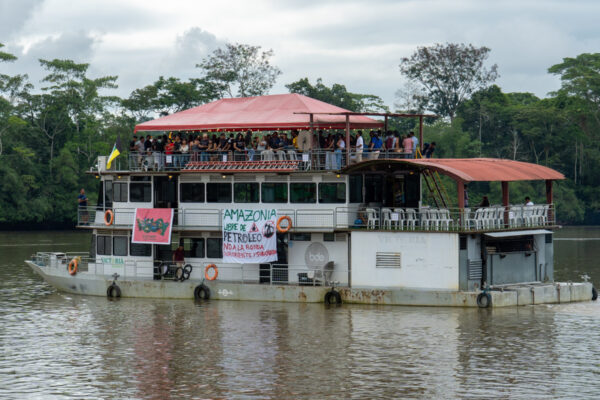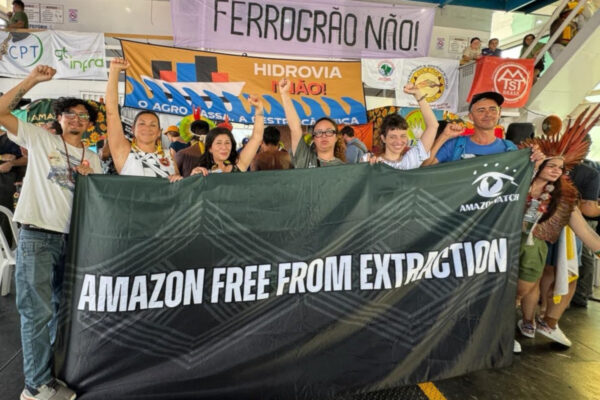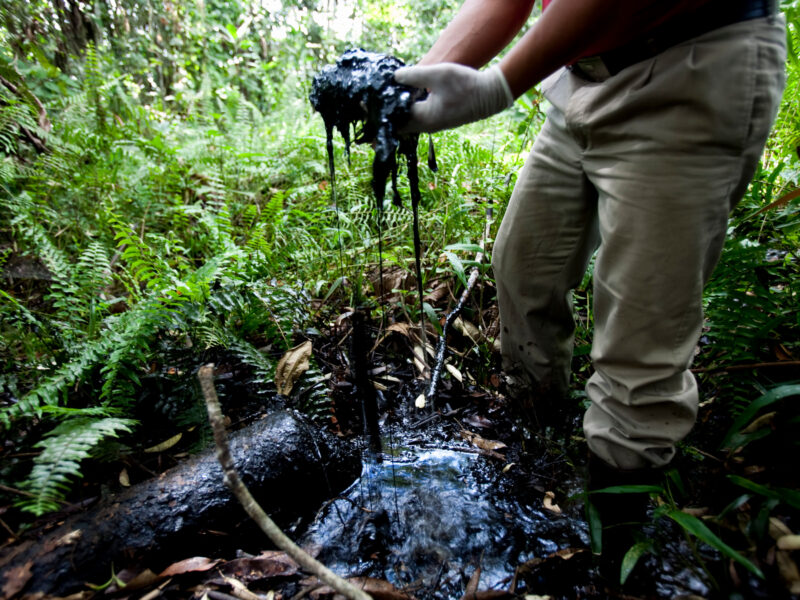First, let’s acknowledge that it is extremely detrimental to the ongoing effort for justice for the people of Ecuador that the press routinely ignores that Chevron admitted to deliberately dumping over 16 billion gallons of toxic oil-waste into the Amazon as a cost-saving measure over the course of decades while operating under its Texaco brand. It never once apologized nor made any meaningful effort to clean up that toxic waste nor assist any of the people it poisoned. Full stop.
Every article about the issue should begin with those undisputed facts.
Chevron’s Big Lie is that none of this occurred and that the company is actually the victim of the very people in Ecuador it poisoned and their lawyers in the U.S., principally the courageous human rights advocate Steven Donziger.
Every argument the oil company makes is designed to perpetuate this Big Lie and to distract from that first undeniable truth of its pollution. Why would anyone take Chevron’s claims at face value, knowing that they committed such a heinous crime and show absolutely no remorse? The answer is painfully obvious: it’s racism.
In fact, racism is central to the uncritical acceptance by many in the media of Chevron’s Big Lie.
Chevron and its army of lawyers at the “kill step” firm of Gibson Dunn & Crutcher are counting on systemic racism to give them cover. Anyone who reviews the coverage by the U.S. legal press – including this week’s flawed article in the New York Law Journal – or in the silence of the large media outlets will see the role this racism plays. The only way to present an argument that looks in any way as if Chevron is a victim and not the criminal it is if it ignores multiple critically important facts.
Most important to always remember is that 17 appellate judges in Ecuador, including its entire Supreme Court and Constitutional Courts, reviewed the facts of the case and validated the $9.5 billion judgment. On top of that, three appellate courts in Canada – including the entire Canadian Supreme Court – validated the judgement for enforcement purposes and implicitly rejected Chevron’s bogus claims of fraud and ghostwriting. How many articles about this case mention those facts? Hardly a single one.
What almost all U.S. coverage of the issue does mention, however, is that a single U.S. trial judge Lewis A. Kaplan ruled in 2014 that the Ecuadorian judgment was procured by fraud. Kaplan stands alone among all judges in the world in this ruling. But Kaplan got it horribly wrong, as any objective observer can see.
What Chevron and its allies do not want you to know, and is rarely reported, about Kaplan and his decision:
- Prior to even hearing the case, Kaplan – in an act of brazen judicial imperialism – attempted to issue an illegal global injunction commanding every court in the entire world to not enforce the Ecuador judgment.
- Kaplan then assigned Chevron’s RICO case to himself, denied Steven Donziger and the Ecuadorians a trial by jury, and ruled from the bench after refusing to even consider any of the environmental evidence used to convict Chevron in Ecuador.
- Kaplan also permitted Chevron to pay vast sums of money – $2 million at least – to its star witness Alberto Guerra and allowed company lawyers to coach him prior to his false testimony for at least 53 days.
- The same witness produced no forensic evidence of ghostwriting and later recanted key parts of his testimony and admitted to lying on Chevron’s behalf because they were paying him to do so.
- Kaplan didn’t disclose his own investments in Chevron and repeatedly made overtly biased statements from the bench throughout his proceedings.
- The higher court that upheld Kaplan’s judgment did not consider any of Kaplan’s factual findings and ruled only on legal issues, and U.S. federal judges have almost unlimited power to run civil suits however they please. It did not consider Guerra’s admission of lying on the stand nor the forensic evidence from the government of Ecuador disproving Guerra’s key claim of ghostwriting.
- Kaplan called the entire Ecuadorian judiciary corrupt and with no clear understanding of Ecuadorian law (he doesn’t even speak or read Spanish) he presumed to invalidate the decision of the Supreme Court of another sovereign nation from his courthouse in Manhattan. When has that ever happened before? (Imagine an Ecuadorian trial judge presuming to overrule the U.S. Supreme Court.)
- Kaplan’s judgment specifically notes that it did not consider the actual claims of environmental destruction and deadly contamination in Ecuador nor make any determination about Chevron’s liability for it.
- The Supreme Court of Canada ruled unanimously that the Ecuadorian affected communities had a valid judgement and could proceed to seek its enforcement.
Every journalist who writes about this case must ask themselves why they give more credence to the word of one obviously-biased U.S. trial judge over the collective wisdom of 29 appellate judges from Ecuador and Canada with vastly more direct knowledge of the case and the underlying issues connected to Chevron’s actions in Ecuador. Do the collective opinions of 29 Ecuadorian and Canadian judges simply matter less than the opinion of one U.S. judge who refused to even look at the actual evidence?
It is simply racist to assume judges in Ecuador are biased because they are Ecuadorians, but Kaplan is not because he is white and a member of the U.S. judiciary.
Journalists in the U.S. have even gone so far as to allow Chevron to rewrite history. In May 2020, Bloomberg refused to remove “alleged” from a sentence in their story that stated “Texaco Inc.’s alleged dumping of toxic drilling wastes” despite the fact that the company had admitted it dumped toxic waste. This was after Chevron’s CEO Michael Wirth falsely claimed there was “no scientific evidence of contamination” in Ecuador after multiple courts had found otherwise. Forget that Chevron already admitted to that fact that Texaco intentionally dumped the waste. When I politely asked Bloomberg to edit the story to reflect the fact that the contamination was not “alleged” and demonstrated proof of Texaco’s public admission of dumping, Bob Tricchinelli of Bloomberg replied in a one-line email: “We’re not updating the story.”
Even after internal emails proved that Chevron’s intentional strategy was to “demonize Donziger” the burden always seems to shift to Donziger to clear himself. And yet even when he does that, it changes very little. When faced with the opinions of hundreds of international organizations, human rights leaders, environmental justice advocates, distinguished members of the international legal community, and others in support of Steven Donziger, there seems to be only one opinion that matters to journalists – Lewis Kaplan’s.
When journalists repeatedly ignore these facts and all of the people who have stood up to Chevron (at great personal risk), of course readers could conclude Steven Donziger is a terrible person who was just out to make a buck (albeit playing the long game, as in several decades long game). Doing so unjustly vilifies Donziger, dehumanizes and devalues the people of Ecuador and their entire judicial system, and plays directly into Chevron’s racist strategy.














